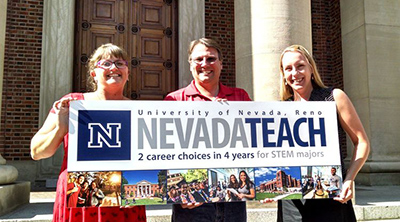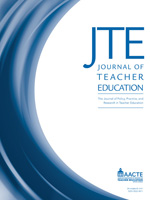21 Mar2017
By Sharon Brennan
The views expressed in this post do not necessarily reflect the views of AACTE.
Classrooms today are more diverse than ever. Students come with a wide array of learning modalities, interests, and life experiences and represent increasingly varied socioeconomic, religious, and cultural backgrounds. As of 2014, according to the National Center for Education Statistics, “minorities” now constitute the majority of PK-12 students in U.S. public schools, and more than 10% of students are considered English language learners (ELLs). How can we better prepare our candidates to “reach and teach” all children in today’s schools?
16 Aug2016
By Rodrick Lucero
Are your teacher candidates prepared to work with LGBTQ students? We’d like to learn about your perspectives and practices in our joint survey with the Gay, Lesbian, and Straight Education Network (GLSEN) and the Association of Teacher Educators (ATE), which closes September 15.
In educator preparation, we continually strive to prepare teachers to be more inclusive of and responsive to the range of human diversity their students bring. To help inform this work, it’s useful to survey the field periodically to monitor trends in practice and define a course for moving forward.
12 Jan2016
By Melissa M. Burnham and Cece Zhou

Ed Prep Matters is featuring “Stories of Impact” to showcase AACTE member institutions with educator preparation programs that are making a positive impact in their communities and beyond through innovative practices. We are committed to sharing members’ success stories and encourage you to do the same.
Teacher shortage is an issue nationwide but especially in Nevada, where 955 classrooms were without licensed teachers at the start of the 2015-16 school year. Now with engineering and technology giants Tesla and Switch establishing a strong presence in northern Nevada, top-quality teachers are in more demand than ever in our community.
04 Aug2015
By Sungti Hsu
A new report calls on states to ensure more intentional preparation of educators to work with struggling learners, including students with disabilities, English language learners, and students with unidentified learning and behavior needs, to address persistent achievement gaps. The report, issued by the Council of Chief State School Officers (CCSSO) and the University of Florida’s Collaboration for Effective Educator Development, Accountability, and Reform (CEEDAR) Center, builds on a 2012 paper from CCSSO about policies to transform educator preparation generally—whose recommendations were supported by AACTE—and echoes messages of a recent policy brief developed by AACTE and the National Center for Learning Disabilities.
10 Jun2014
By Elizabeth Ross
The Innovations Inventory of AACTE’s Innovation Exchange is an online database highlighting members’ pioneering practices in educator preparation that have shown a positive impact on issues of student learning, preparation program advancement, or educator workforce needs. This blog post is one in a series highlighting entries from the inventory. To request inclusion of your institution’s innovations, contact Zachary VanHouten at zvanhouten@aacte.org.
 Georgia State University (GSU) is the largest producer of minority educators in the state of Georgia and graduates approximately 500 teachers annually. GSU’s Network for Enhancing Teacher Quality (NET-Q) program aims to increase teacher quality in urban and rural areas in Georgia. The program includes both pre- and postbaccalaureate initiatives for educators serving high-need school districts in these settings.
Georgia State University (GSU) is the largest producer of minority educators in the state of Georgia and graduates approximately 500 teachers annually. GSU’s Network for Enhancing Teacher Quality (NET-Q) program aims to increase teacher quality in urban and rural areas in Georgia. The program includes both pre- and postbaccalaureate initiatives for educators serving high-need school districts in these settings.
NET-Q boasts a partnership with at least 15 rural PK-12 schools, local businesses, two historically Black colleges, and the National Commission on Teaching and America’s Future.
17 Apr2014
By Jane E. West
Tomorrow, April 18, is the deadline for public comment on the proposed “highly qualified teacher” (HQT) data collection by the U.S. Department of Education. A detailed letter submitted yesterday by the Coalition for Teaching Quality hails the proposed collection as “an important first step towards meeting the legislative intent” of Congress’ directive to report on the extent to which students in certain high-need categories are taught by teachers who are labeled as “highly qualified,” but who are actually teachers-in-training in alternative routes.
24 Feb2014
By Catherine Emihovich
In addition to my work in educator preparation at the University of Florida, I am a member of the Anthropology Education Task Force (AETF) of the American Anthropological Association (AAA). Among other things, our task force is charged with examining the potential role of anthropology in teacher education programs to prepare teachers for working in culturally and linguistically diverse schools. We would greatly appreciate AACTE members’ input on this work, if you are able to take 15-20 minutes from your busy schedule to respond to our survey (see below).
As readers of this blog are aware, the rapid demographic changes sweeping across the United States bring increasing importance to ensuring that teachers are well prepared to teach culturally and linguistically diverse students. AAA is eager to partner with AACTE members in this endeavor, and to demonstrate that key anthropological concepts can play a significant role in helping teachers develop more effective strategies for addressing diverse students’ needs. For example, through its award-winning RACE Project exhibit (http://www.understandingrace.org/), AAA has enabled thousands of teachers and students across the country to deconstruct destructive myths surrounding racial differences. The web site provides numerous thought-provoking activities and curricular materials to engage students in more meaningful classroom dialogues about a topic that has long ruptured our social fabric.
21 Feb2014
By Joyce Nutta
The author is a member of AACTE’s topical action group on Preparing Educators of English Learners. The views expressed in this post do not necessarily reflect the views of AACTE.
Are you interested in meeting other educators who address teaching English learners in their teacher preparation programs? Would you like to discover new ways your colleagues are preparing all candidates to support the success of these students? Come to the inaugural meeting of AACTE’s Preparing Educators of English Learners (PEEL) Topical Action Group to learn about joining our current projects—and help brainstorm future projects and opportunities for advocacy by our group.
09 Jan2014
By Aimee Hall
 AACTE’s 2014 Speaker Spotlight Session will feature Kris Gutiérrez, professor of literacy and learning sciences at the University of Colorado at Boulder.
AACTE’s 2014 Speaker Spotlight Session will feature Kris Gutiérrez, professor of literacy and learning sciences at the University of Colorado at Boulder.
Gutiérrez uses her expertise to improve the educational condition of immigrant and other underserved students, in both school-based and community settings, and to design effective models for teacher preparation. For more than 15 years, Gutiérrez served as the principal investigator and director of an after-school computer learning club for low-income and immigrant children. She also spent over a decade directing the UCLA Migrant Scholars Leadership Program, a residential summer academic program for high school students from migrant-farmworker backgrounds.
10 Dec2013
By Kristin McCabe

The January/February 2014 issue of the Journal of Teacher Education (JTE) is now available online. See what Volume 65 Number 1 has to offer—without waiting for the mail delivery!
- In this month’s editorial, JTE‘s editors at Penn State University announce the 2014 Editorial Review Board and outline the highlights of this issue’s articles.
- “The Effects of Teacher Entry Portals on Student Achievement” classifies North Carolina public school teachers into 11 predominant “portals” of entry into the profession and estimates their effects on students’ test score gains. The gains are generally higher for students of teachers prepared through in-state, public undergraduate programs—but Teach for America corps members seem to be more effective in STEM subjects and at the secondary level.








 Georgia State University (GSU) is the largest producer of minority educators in the state of Georgia and graduates approximately 500 teachers annually. GSU’s
Georgia State University (GSU) is the largest producer of minority educators in the state of Georgia and graduates approximately 500 teachers annually. GSU’s  AACTE’s 2014 Speaker Spotlight Session will feature Kris Gutiérrez, professor of literacy and learning sciences at the University of Colorado at Boulder.
AACTE’s 2014 Speaker Spotlight Session will feature Kris Gutiérrez, professor of literacy and learning sciences at the University of Colorado at Boulder.